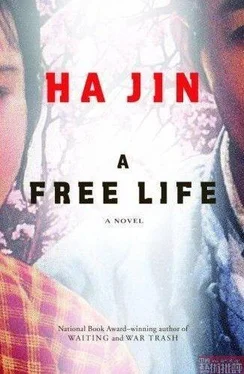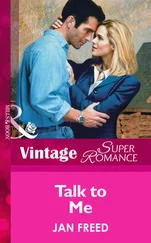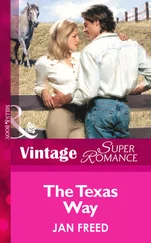DICK and Nan set out early on Sunday morning. It was a gorgeous day, cool and clear after a mist had lifted. Sunlight fell on the dew-drenched tree leaves, which flickered in the breeze. They drove along Route 575 for an hour and a half, took a break at Blue Ridge, then continued north. Half an hour later they crossed the Georgia border, and then after a few miles of hilly gravel road filled with doglegs, they found Bao's place on the mountain. To Nan 's amazement, Bao was cut off from the outside world, living like a recluse. No house was visible from his studio, which was a large, high-pitched wooden shack with broad windows. The fresh wood, not painted yet, was whitish and rough-hewn, giving off an intense pine scent. Behind the studio was parked a brown travel trailer in which Bao cooked his meals and slept at night. Beside the trailer sat a burgundy passenger van. Sometimes he'd drive to a Chinese restaurant in Postelle, a tiny town about five miles to the north, to have lunch or dinner. On weekdays he devoted himself to painting and would meet his students only on weekends.
Bao hugged both guests warmly. He was more like a middle-aged man now, wearing a crew cut and having gained about twenty pounds, but he was the picture of health. His bronzed face reminded Nan of a peasant who worked in the elements. Bao told them that he swam in a nearby man-made lake every day.
In the studio were lounging three students of his. One of them was Frank, a fortyish man wearing glasses. He was the lawyer who owned the land and the studio. The other two were in their mid-twenties, Brian and Tim. Tim was tall and thin, but muscular like a basketball player, with a reddish mustache; Brian was a Vietnamese American, born in Vietnam, with a handsome face that was rather Mongolian. Brian told Nan that his last name was Ho. His father had fled to the United States in the 1970s after Saigon fell, and a year later his mother, carrying him on her back, had come to America and joined his dad. Unlike these two hardy young fellows, Frank looked studious, skinny, and heavily myopic. The students' demeanor showed a good deal of respect for their teacher, though Bao was casual and often patted them on the shoulder and back. He was louder and happier than before. He spoke English as if yelling at someone and often added a high-pitched laugh after a sentence. Nan wondered when Bao had started to speak English like this, without hesitation.
Nan scanned the studio. Against the walls leaned about twenty paintings, mostly still lifes of fruits, flowers, trees, bowls of food, rocks, clumps of stars in the indigo sky. There were a few idyllic pieces of animals and young women, which were reminiscent of French impressionism.
"I work very hard these days," Bao said to the guests. "One day, one painting."
"So you must've made a lot of money," Dick said.
"I'm impressed," Nan admitted.
He noticed that these paintings differed palpably from Bao's former works. Most of them were bright and buoyant, full of life, sunlight, and exuberance, without any trace of the violent colors and tragic tones that used to suffuse his paintings. Evidently Bao's life in America had affected his art. These pieces had shed the depressive agitation, the jaundiced view of the world, and the dark despair; instead, they gave the feeling of warmth and contentment-there was light everywhere. Yet on second thought, Nan wasn't sure whether the change had stemmed from within the artist or from his effort to meet the needs of the American market. He could find little originality in these paintings.
"Each piece here is worth at least a thousand dollars," Tim told the visitors.
"So that's your price?" Dick asked Bao.
"Actually his Washington, D.C., series sold for more than forty thousand," Frank broke in, pushing up his glasses with his thumb.
"Here, I show you." Bao led the visitors to a long trestle table on which sat three bulky albums. He opened one of them and said, "Here's the series."
Nan and Dick looked at the photos of the paintings, which were indeed impressive, presenting the U.S. capital in a fresh, bright way, as if the city were a large park where woods gleamed in the morning sun and where shimmering cathedrals, half shaded, were massive like hills. "I just did one series," explained Bao. "My agent want me to do more, but I refuse."
"Why?" asked Dick.
"I don't want to repeat my work."
That answer puzzled Nan. By nature Bao was shrewd and pragmatic. Perhaps he meant to keep something unique in his repertoire so as to maintain and increase the value of his work. Nan didn't ask more and went on thumbing through the albums. They contained hundreds of photographs of Bao's paintings in different styles: landscapes that revealed the influence of traditional Chinese painting, avant-gardish pieces like advertisements, impressionistic gouaches and aquarelles, still lifes, portraits of girls and various kinds of artists. Among them Bao took great pride in the few he had painted with a palette knife. Indeed, these pieces of cityscape and waterside looked vigorous, striking, and primitively spontaneous. He said he himself had invented the technique, called "knife painting." Though impressed by the scope of Bao's works, Nan asked him, "Do you still write poetry?"
"Not anymore. I've found painting suits me better."
"How about your memoir?"
"I'm still working on it."
Nan realized Bao would never complete that book, which he must have scrapped.
A moment later Bao cut open a huge watermelon, and together they sat on the deck, conversing, drinking beer, and eating watermelon and grapes. Tim and Brian edited an art magazine called Blue Stars, which had just published a lengthy article on Bao and his works, praising him as "a master on the mountain." Tim was its author and prided himself on the writing.
Because of his poor English, Bao couldn't fully make out the elaborate sentences in the article, so he asked Nan to tell him what they meant. He insisted that Nan translate every word for him orally on the spot. Although aware of Brian's slightly ironic grin, Nan went ahead and explained the article sentence by sentence while Bao kept nodding and listening intently, his eyes blinking constantly. Nan felt his host was like a small boy, vain but in an innocent way. Somehow Bao differed remarkably from his former self, carefree and natural, though there was still a little edginess in his bearing and his face still betrayed a small bit of uncertainty. He laughed loudly whenever Nan rendered a flattering phrase into Chinese.
It took twenty-five minutes for Nan to finish translating the article. Then they resumed talking about the people they knew living in New York. Bao confessed he had fallen in love with a Chinese woman two years before, but her parents despised him and wouldn't let her marry him. In their eyes he was a ne'er-do-well, not a match for their daughter, who was now working on a Ph.D. in biology at Vanderbilt. He followed her to Nashville, though her mother had said to his face that he was merely a toad dreaming of nabbing a swan. "I give them ten my best paintings," he told the guests.
"They must be rich now," Dick said.
"I don't think so."
Brian put in, "They used his paintings as tablecloths, and one by one they ruined them. Then, last fall, they went to Bao's show in D.C. and were flabbergasted at the sight of the prices. They couldn't take their eyes off the price tags, man: six or seven thousand bucks apiece. The fact is that those paintings they destroyed were worth much more."
"That's old story," Bao said calmly. "It's over between she and I. We have no luck, no chance, no together. After she go away for another guy, I move to the mountain and work harder here. I'm stupid man, no luck with ladies."
Nan laughed, then checked himself. He remembered that Bao had once been a goatish fellow. How come this libertine had changed so much? Probably his success had given him more confidence and made him want to be a responsible man.
Читать дальше












